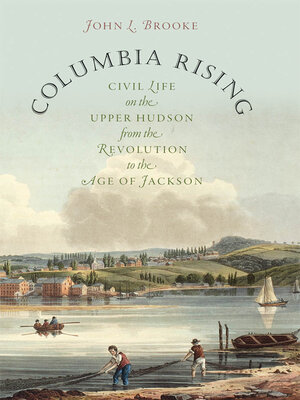Columbia Rising
ebook ∣ Civil Life on the Upper Hudson from the Revolution to the Age of Jackson · Omohundro Institute of Early American History and Culture and the University of North Carolina Press
By John L. Brooke

Sign up to save your library
With an OverDrive account, you can save your favorite libraries for at-a-glance information about availability. Find out more about OverDrive accounts.
Find this title in Libby, the library reading app by OverDrive.



Search for a digital library with this title
Title found at these libraries:
| Loading... |
In Columbia Rising, Bancroft Prize-winning historian John L. Brooke explores the struggle within the young American nation over the extension of social and political rights after the Revolution. By closely examining the formation and interplay of political structures and civil institutions in the upper Hudson Valley, Brooke traces the debates over who should fall within and outside of the legally protected category of citizen. The story of Martin Van Buren threads the narrative, since his views profoundly influenced American understandings of consent and civil society and led to the birth of the American party system. Brooke's analysis of the revolutionary settlement as a dynamic and unstable compromise over the balance of power offers a window onto a local struggle that mirrored the nationwide effort to define American citizenship.
|In Columbia Rising, Bancroft Prize-winning historian John Brooke explores the struggle within the young American nation over the extension of social and political rights after the Revolution. By closely examining the formation and interplay of political structures and civil institutions in the upper Hudson Valley, Brooke traces the debates over who should fall within and outside of the legally protected category of citizen.
The story of Martin Van Buren—kingpin of New York's Jacksonian "Regency," president of the United States, and first theoretician of American party politics—threads the narrative, since his views profoundly influenced American understandings of consent and civil society and led to the birth of the American party system.
Brooke masterfully imbues local history with national significance, and his analysis of the revolutionary settlement as a dynamic and unstable compromise over the balance of power offers an ideal window on a local struggle that mirrored the nationwide effort to define American citizenship.
|In Columbia Rising, Bancroft Prize-winning historian John Brooke explores the struggle within the young American nation over the extension of social and political rights after the Revolution. By closely examining the formation and interplay of political structures and civil institutions in the upper Hudson Valley, Brooke traces the debates over who should fall within and outside of the legally protected category of citizen.
The story of Martin Van Buren—kingpin of New York's Jacksonian "Regency," president of the United States, and first theoretician of American party politics—threads the narrative, since his views profoundly influenced American understandings of consent and civil society and led to the birth of the American party system.
Brooke masterfully imbues local history with national significance, and his analysis of the revolutionary settlement as a dynamic and unstable compromise over the balance of power offers an ideal window on a local struggle that mirrored the nationwide effort to define American citizenship.






